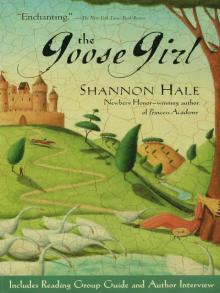- Home
- Shannon Hale
The Forgotten Sisters Page 2
The Forgotten Sisters Read online
Page 2
Servants and guards knew Miri, and she wandered freely through the white stone palace as she had always done. The linder stone beneath her feet was as white as cream, with pale green veins, quarried from Mount Eskel generations before. Miri had grown up climbing on rough blocks of linder, breathing linder dust, and drinking from a stream white with it. But the beauty of polished linder still filled her with awe.
She climbed stairs until she reached the top floor and a balcony facing north. She could not see Mount Eskel all the way from Asland, just a hint of purple mountains far against the horizon. The wagons would be miles away by now and take days more to reach the mountain pass.
Dozens of times she had imagined her return—embracing Pa and Marda, giving them her carefully chosen gifts. If she agreed to accept the king’s errand, Peder would deliver the gifts with the message that Miri was not coming yet. Despite the new boots and chocolates, there would be no joy beside their little hearth.
“I’m not going home.” She whispered the words aloud to convince herself they were true.
She sat down, stared north, and let the minutes ride away from her like Peder in the wagon.
Royals aren’t the only ones with obligations. She thought the words hard, as if they were stones she could throw at the chief delegate.
She was in the palace library reading about tutorships when she heard quarry-speech—not heard so much as felt, a vibration that entered her and created an idea in her mind. On Mount Eskel, quarry workers used quarry-speech to communicate warnings and instructions, when deafening mallet blows made it impossible to hear normal talk. Miri had discovered that quarry-speech traveled only through linder stone and communicated through memories. The quarry-speech entering her now had the sense of Katar about it and prompted a memory of playing hide-and-find-me as a child. With that memory, Katar was asking Miri, Where are you?
Miri knocked on the linder in imitation of the quarry workers’ mallet blows and sang a work song. “I spy a dull stone smartly hidden in scree.” Though it was not necessary, singing aloud helped her focus. Quarry-speech had a rhythm to it, and was more like a silent song than simple thoughts. By quarry-speaking a memory of an afternoon she and Katar had spent in the library, Miri was letting Katar know where to find her.
Katar must have reported to Britta where Miri was, because a few minutes later, Britta plopped down on the couch beside her.
“Not too great a day, is it?” Britta said.
“I don’t know what you mean,” said Miri, her voice croaking after so much silence. “I’m having the best time ever. Let’s do it again tomorrow.”
“I could arrange a mass public execution for your pleasure,” Britta said in a stiff, high voice, as if pretending to be an official.
“That would be lovely,” Miri replied in a warbling tone. “And perhaps the physician could entertain me by pulling out all my teeth.”
“I’ll see to it at once, my lady.”
They leaned against each other, Miri’s head on Britta’s shoulder.
“I was too excited to eat breakfast and too sick to eat lunch,” said Miri. “I’d go find some dinner, but the way this day is going, I’m afraid the kitchen is serving something like mud and frogs.”
“The kitchen served mud and frogs yesterday,” Britta said. “Tonight we’re dining on your teeth.”
Miri tightened her belly to encourage a laugh, but she could not quite muster it.
“I want to go home,” she whispered.
“I know,” Britta whispered back. “Selfishly I want you in Asland with me. But this—Lesser Alva, cousins, a princess academy?”
A servant came to fetch them, and they followed him to the king’s personal dining chamber.
“I thought we’d be more comfortable in here,” said the king.
Miri took in the gilded chairs and porcelain dishes in a room that could hold three village houses and suddenly found it easy to laugh.
The king raised an eyebrow.
“Sorry, I wasn’t laughing at you, sire,” she said.
“Of course you weren’t,” he said, his attention returning to his food. “And that is why you are still standing before me and not dragged away to the dungeon.”
“Oh Bjorn,” the queen whispered. “Please don’t upset her now.”
The queen especially seemed to want Miri and no other tutor. Miri had learned during her own time at a princess academy that when people desire something that is in short supply, it is worth more.
She cleared her throat. “I will go to Lesser Alva if, instead of giving me a tutor’s wages, you sign over the land of Mount Eskel.”
For the first time that day, the chief delegate looked directly at Miri.
“When I and the other girls graduated from the princess academy on Mount Eskel, we were made ladies of the princess, a noble title,” said Miri. “I read that when commoners are granted noble titles, they are traditionally given lands tied to their titles—”
The chief delegate interrupted, “It’s been a hundred years or more since—”
“When we were made ladies of the princess, we became the only nobility in the entire kingdom who don’t own land,” Miri continued, her voice louder. “I’m not asking much, just that the ladies of the princess become the owners and caretakers of the village and quarry.”
The chief delegate laughed. “She doesn’t ask much?”
“These are my terms,” Miri said, her voice weakening.
“Give it to her,” said the queen.
“Not the quarry,” said the king.
“Give it to her,” the queen repeated.
The king harrumphed. “If she completes her tutorship, the land under her village is theirs. If she completes her tutorship well and King Fader marries one of the girls in an alliance of peace, then the quarry is theirs.”
Miri did not feel any better. The idea of home, so vibrant just that morning, as large and hot as the sun, had dimmed, pulling back into a faint prick of a star.
“Very well,” Miri said. “I’ll go.”
The queen sighed as if she’d been holding her breath.
Miri asked for parchment and ink to write a letter to Peder explaining about the king’s cousins and the swamp princess academy, as well as the king’s plan to sell Mount Eskel, so Peder would understand Miri did not take up this duty thoughtlessly.
The king commanded one of the royal guards to take the letter to the camp, and he left at once. Miri hooked her ankles around her chair legs to keep from running after him.
The chief delegate talked at her through all seven courses of the meal.
“It is not your place to tell the girls about their future,” he said. “Prepare them to behave like princesses. Enrich their minds, polish their behavior. When we bring them to Asland next spring, King Bjorn himself will inform his cousins about their possible marriage to King Fader. Do you understand?”
Miri had a mouthful of buttered squash, but she nodded.
“You will remain in Lesser Alva through the winter at least,” said the chief delegate. “We do not want them seen in Asland until you have polished them. We cannot afford the chance some nosy courtier might witness their uncivilized behavior. Gossip can travel all the way to Stora.”
The moment the king finished the cheese and cherries course, the chief delegate arose.
“A ship sails west at midnight,” said the chief delegate. “You will be on it.”
Since Miri’s things were long gone, Britta packed some of her own clothing for Miri. The kitchen provided a hamper of food. Steffan pressed a small bag of coins into her hand.
“Thanks,” said Miri. She hugged him impulsively and felt for a moment how life might be different with an older brother.
“My father was king because his older brother died,” said Steffan. “I will be king because I am the only child of my father. Some matters happen by chance. But you, Miri, are not a tutor by chance.”
“If only I’d tried to be a little less remarkable,” she sa
id, trying to smile.
“Duty doesn’t always fit comfortably.” He mimed screwing an invisible crown onto his head, squinting as if it pinched.
“Britta did not choose you by chance. And I approve.”
The chief delegate snatched the coin bag from Miri. “Prince Steffan, his highness your father sends a generous monthly allowance to his cousins in Lesser Alva. You are very kind, but Lady Miri will not need money.”
The moon lingered over the courtyard, almost full and yet so high up it appeared small, no bigger than the print of her pinky finger on glass. Miri stood under the moon, making farewells. Katar gave Miri a fierce hug and ran off. Britta kissed Miri’s cheeks and made promises of letters. The king and queen did not come out at all. Steffan apologized on behalf of his mother, saying that she was unwell.
Miri felt courageous as she stepped into the carriage, a warrior off to some unknown battle.
Courage is not fearlessness, Master Filippus, her tutor at the Queen’s Castle, had taught. Courage is feeling justly afraid and yet still doing what is right.
Was she doing what was right?
She leaned out the carriage window to wave good-bye. Steffan bowed to her, Britta called out luck, and the pinky print of the moon hovered, indifferent in the blackness above.
Chapter Three
A honey bee, a funny flea, a pitter patter sunny sea
A breezy snow, a wheezy crow, a bitter batter easy dough
A teary hymn, a weary limb, a titter tatter cheery swim
A cozy yawn, a nosy fawn, a chitter chatter rosy dawn
Miri spent four days aboard the ship. Brief sails around Asland’s harbor had not prepared her for the open sea. Now she learned that waves could crest white, a ship could fly and fall, and novice passengers were rightly called “green.”
The captain was stout and lively, and advised her to stay up in the open and ride the sickness out. The sky and wind felt as firm as solid ground above her head, and by the second day she could look away from the horizon without fearing she’d have to revisit her breakfast. Without sickness to distract her thoughts, worry and dread swooped in. She sat alone, singing nonsense songs against the wind. “Salty sea and bunnies three, nothing like a honey tea, so fitter fatter, it don’t matter, mind the chatter, scatter me.”
Two royal guards accompanied her—one a thin, trim young man who smiled a great deal, the other balding and dark-eyed. They spoke to each other but rarely to her.
The first time the ship stopped at a port to unload cargo from Asland and load new goods, Miri lent a hand, making the sailors laugh. Apparently noble passengers did not usually engage in merchant work, but Miri was weary of working over her own thoughts.
Soon she was learning to tie knots and climb ropes and trading stories and songs. Miri’s stories were often historical accounts of famous Danlandians. The sailors’ tales involved ports and women and made Miri blush, but she supposed they increased her education in one neglected area.
The last stop on their route was Greater Alva, and by then Miri and the captain spent hours each day talking and laughing.
“There’s no port in Lesser Alva,” the captain explained. “Too boggy. So I’ll only be able to take you as far as Greater Alva. We rarely come all this way to trade, but when the king asks …” He saluted nobly.
“I knew a merchant shipman’s son once,” said Miri. “Timon Skarpson.”
She had not thought his name in so many months that speaking it felt strange in her mouth.
“This is his ship,” said the captain.
“This is Timon’s?” Miri looked around, suddenly afraid he might appear.
“Actually, he was going to be on this voyage,” said the captain, “but when we received the order to transport you, he decided to stay ashore. He said you two had a troubled history and you might be uncomfortable trapped aboard together.”
“That was gentlemanly of him,” she said. “And he was right. But would you carry a message? Just let him know that all is forgiven and I hope he’s well.”
The captain squinted. “I don’t detect a broken heart about you, and certainly you have a love you left behind, given how often you hold that stone hawk of yours. My guess is Timon behaved badly and so missed out on being the one to give you a gift you would treasure as much as that hawk. A shame for his sake.”
Miri felt like blushing but laughed instead.
In Greater Alva’s harbor only a few fishing boats bobbed. Miri went ashore, immediately suspicious of the ground that neither rose nor fell. Her legs had gotten used to the motion of the sea and now refused to appreciate firm earth.
The port city was considerably smaller than Asland and smelled of fish. She ate lunch with the royal guards at the dockside tavern, her stomach too nervous to enjoy the salty fish stew. They hired an open carriage to take them out of town and a few hours through fields of wheat and barley. At the mouth of a scrubby forest, the wheel ruts of the road stopped.
“We walk the rest of the way,” said one of her guards, shouldering her pack.
The farther they walked, the narrower the road became, until the thin, branchy trees tapped Miri’s shoulders and touched overhead. The ground was spongy. The air was close. Miri wiped her forehead with her sleeve.
Astrid, Felissa, and Susanna. Miri thought the names of the royal cousins over and over again, from oldest to youngest. They seemed to be just words, not names. She could not imagine faces to match, let alone a palace in a swamp, or even a swamp at all. Nothing seemed quite real. It was as if she were walking through the landscape of a dream.
Miri was no tutor, no matter that the king had signed a paper saying so. Her instructor at the princess academy, Tutor Olana, had been a grown woman, smart and well-read, and as scary as a viper in a basket.
Miri was short, young, and undereducated. She must appear as imposing as Tutor Olana had been, or the royal cousins would never respect her. Miri would walk into Lesser Alva with head high, shoulders back, eyes glinting with secret knowledge, voice firm and commanding.
Astrid. Felissa. Susanna.
The trees finally petered out. Miri took a deep breath—and coughed. The air was even thicker here than in the woods, wet and muggy and full of rotting things. Sweat pricked her skin.
From the edge of the woods, the ground sloped down. Sunlight glinted off mud and water. A wide, slow river ended in a marshy lake, twinkling between rising arms of land. Miri knew from maps that the water eventually joined an inlet of the sea. Straight ahead, a village sat on an island in the middle of the sludgy water. All the houses were built of dried reeds.
The water was busy with two-person boats—long and narrow, made of tightly bound bundles of reeds. The person in the bow of each boat held a barb-tipped spear, punting with the flat end in the water. The person behind held a long-poled net. They were fishing. Or hunting, Miri supposed.
Far off to the right on a solitary patch of high, dry ground, looking like a porcelain cup in a pig sty, stood a small cube of a house built entirely of linder.
“Lesser Alva,” said the older of the guards. “Well, good luck.”
He put down Miri’s pack and turned to go.
“Wait!” she said. “You’re not staying?”
“Our orders were to deliver you safely to Lesser Alva,” he said as he walked away. “The royal cousins live in the white stone house. The servants of their house will take care of you. We need to reach Greater Alva before dark if we’re to make the ship back.”
“But …” Miri followed after them, clutching her hands. “But don’t you want to stay the night? At least?”
“I don’t like snakes,” the younger guard said apologetically. He flashed a helpful smile before disappearing into the trees.
Miri stood listening to the sounds of the guards walking away, leaves flapping, branches snapping. The sounds stopped. And then started again. Were they returning after all? Hope flared like a burn against her heart. But instead of returning guards, a small brown animal e
merged, scurrying right across her foot. She stifled a scream and turned around.
People had gathered from the village to watch her. Surprised, she slipped and fell on her backside. Mud seeped through her skirt and leggings. The crowd was mostly children, and they kept staring.
“You don’t look like a trader,” said one child.
“No, I’m just … going over there,” Miri said, pointing to the linder house. She grabbed her pack and stumbled away.
Chickens ran loose, clucking with annoyance and attacking insects that had the gall to hide beneath dead leaves. A flock of thin, long-necked birds flew off the water, settling on a shore. Against the deep brown and green background, their bright whiteness looked as startling in that setting as the linder house.
The sunlight on the water flashed and glared. Miri squinted, her head pounding. The straps of her pack cut into her shoulders. The ground was slippery, her boot soles thick with mud. She could not spare a hand to wipe the sweat dripping onto her cheeks.
You are a tutor, she told herself. You have to be imposing!
The wooden door in its frame looked swollen and misshapen, though perhaps years ago it had fit properly in the cut stone. It swung inward at her first knock, squeaking on its hinges.
“Hello?” Miri called out. She stepped inside.
The building was only one room, and it was nearly empty. The polished stone floor tilted to one side, some stones jutting higher than others, as if over the years the ground had settled.
“Who’s there?”
A girl was climbing in through one of the open windows, followed by two others. They wore loose brown shirts and leggings, stained even browner up to the knees, and held sticks and poles.
“Who are you? What are you doing in our house?” asked the tallest one.
In their house? These wild girls were the royal cousins? Miri guessed the tall one was Astrid, the eldest girl.

 The Princess in Black and the Perfect Princess Party
The Princess in Black and the Perfect Princess Party The Princess in Black and the Hungry Bunny Horde
The Princess in Black and the Hungry Bunny Horde The Unfairest of Them All
The Unfairest of Them All Forest Born
Forest Born 2 Fuzzy, 2 Furious
2 Fuzzy, 2 Furious The Actor and the Housewife
The Actor and the Housewife The Goose Girl
The Goose Girl Palace of Stone
Palace of Stone Midnight in Austenland
Midnight in Austenland Enna Burning
Enna Burning Dangerous
Dangerous The Storybook of Legends
The Storybook of Legends Princess Academy
Princess Academy Austenland
Austenland The Forgotten Sisters
The Forgotten Sisters The Unbeatable Squirrel Girl: Squirrel Meets World
The Unbeatable Squirrel Girl: Squirrel Meets World Book of a Thousand Days
Book of a Thousand Days Fire and Ice
Fire and Ice The Princess in Black Takes a Vacation
The Princess in Black Takes a Vacation River Secrets
River Secrets The Princess in Black
The Princess in Black Books of Bayern Series Bundle
Books of Bayern Series Bundle True Heroes
True Heroes Austenland: A Novel
Austenland: A Novel The Princess in Black and the Science Fair Scare
The Princess in Black and the Science Fair Scare![[Bayern 02] - Enna Burning Read online](http://i1.bookreadfree.com/i1/04/02/bayern_02_-_enna_burning_preview.jpg) [Bayern 02] - Enna Burning
[Bayern 02] - Enna Burning Ever After High
Ever After High Monster High/Ever After High--The Legend of Shadow High
Monster High/Ever After High--The Legend of Shadow High